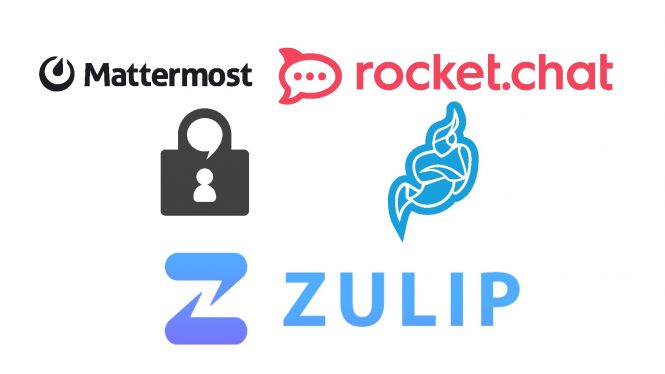 Self-hosted alternatives to Telegram
Self-hosted alternatives to Telegram
With Pavel Durov, the founder and CEO of Telegram, detained in France, it makes sense to rethink your communication strategy, or, at least, learn about the alternatives currently available on the market. True, it doesn’t feel like that messaging app (it’s much more than that now, taking on mammoths in many niches, from video hosting to cryptocurrency, but we’ll stick to its primary purpose) is going away, or the quality of service expected therefrom will deteriorate. Still… who knows? Maybe it won’t be as secure as it used to be anymore. And not as private. So, for businesses and individuals that need to communicate sensitive information, we’ve picked 5 alternatives to Telegram that focus on encryption, privacy, and are self-hosted.
1. Rocket.Chat
 Rocket.Chat communication platform
Rocket.Chat communication platform
Rocket.Chat was first released in 2015 by Rocket.Chat Technologies Corp. This open-source platform offers a highly customizable and secure environment for team communication, with native clients available for both Windows and macOS computers. Rocket.Chat supports audio and video conferencing, and has a penchant for enabling customer interactions, if you need them. All conversations are end-to-end encrypted, solutions ISO 27001 certified and compliant with GDPR, CCPA, LGPD, and HIPAA. Free for teams up to 25 people.
Pros and cons of Rocket.Chat self-hosted communication platform
Pros
- Highly customizable and secure.
- Supports audio and video conferencing.
- End-to-end encryption.
- Integrates with various third-party applications.
Cons
- Setup is not for the uninitiated (there’s tech support, though).
- Bigger crowds and more advanced features are in paid plans only.
Download Windows client of Rocket.Chat
2. Mattermost
 Mattermost communication platform
Mattermost communication platform
Mattermost has been around since 2016. This self-hosted team collaboration platform takes itself seriously, and has reasons for that, in fact: the list of customers using Mattermost includes US Air Force, CERN (this is where the Large Hadron Collider is), and DuckDuckGo, a search engine and browser with a fixation on privacy. Mattermost possesses seamless and simple integration capabilities, which means it’ll be easy to continue using, say, MS Teams and add this comm environment to the mix.
Mattermost communication platform pros and cons
Pros
- Robust integration capabilities.
- Encryption at both server and communication levels.
- Customizable user interface.
- Native clients for Windows and macOS.
Cons
- Deployment requires technical expertise.
- Free version is rather limited, compared to the competition.
Download Mattermost client for Windows
3. Jitsi
The predecessor of Jitsi was first released in 2003, and the product has been developing well since then. Today, it is a full-fledged open-source communication tool focusing primarily on videoconferencing, with due attention to instant messaging. You can set up a meeting and use Jitsi at its meet site; for more sophisticated setups, try the self-hosted version and JaaS, which stands for Jitsi-as-a-Service.
However, Jitsi's primary focus on video conferencing means it may not be as robust in messaging features compared to other platforms. Teams looking for a comprehensive communication solution may find that Jitsi lacks some of the messaging functionalities they require.
Jitsi open source videoconferencing and communication platform pros and cons
Pros
- Excellent videoconferencing features
- No account required for meetings
- Supports screen sharing
- As free as it gets, both self-hosted and Jitsi Meet
Cons
- The focus on videoconferencing means the messaging component is barebones.
- Deployment on your own server can take time and requires a certain level of expertise.
4. Zulip
Zulip, initially released in 2012, practices a unique approach to team communication with its topic-based threading model for conversations (channels), claimed to be equally good for live and asynchronous text communication. The latter feature, support for forum-like discussions, is particularly useful for teams that operate across different time zones. Zulip's ability to integrate with various tools and services enhances its utility, but may be considered a drawback, since, for example, video calls are only possible through hooked-up Jitsi, Zoom, etc.
Zulip open source team messaging platform pros and cons
Pros
- Unique threading model for conversations.
- Supports both real-time and asynchronous communication.
- Integrates with various tools and services.
- Full-featured as a self-hosted solution.
Cons
- Somewhat complicated interface.
- Reliance on third-party solutions for calls.
- Only basic encryption (TLS) out-of-the-box.
5. Tox
Tox is a peer-to-peer communication platform that prioritizes privacy through reliance on a decentralized architecture, i.e., there is no central server, which mitigates data-related risks and enhances security. As a protocol, Tox has been around since 2013; today, it is a completely free messaging and video calls solution that encrypts data streams end-to-end, allows file sharing in group chats and boasts other industry-grade features that typically come at a certain cost.
Tox communication platform pros and cons
Pros
- Focus on privacy with E2E encryption and decentralized architecture.
- Set of features for most team collaboration scenarios.
- Free.
- Has a number of clients, pick the one you like most.
Cons
- Certainly requires expertise to set up.
- May lack some advanced features that paid solutions have.
Get qTox, one of the most popular Windows clients for Tox
There you have it, the list of platforms and services alternative to Telegram! Let’s wish it weathers all storms and emerges even better from them, and still be prepared for the worst-case scenario.






